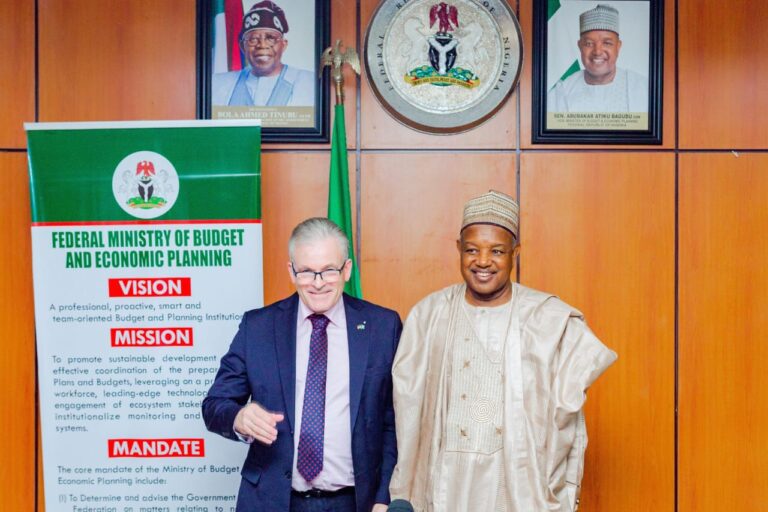Nigeria is advancing fresh talks with German industry leaders to strengthen collaboration in technology transfer, skills development, and regulated labour mobility, all central to the nation’s drive toward building a $1 trillion economy by 2030.
This renewed partnership focus emerged during a meeting in Abuja between the Minister of Budget and Economic Planning, Senator Abubakar Atiku Bagudu, and a delegation from the Chamber of Industry and Commerce (IHK) Giessen-Friedberg, Germany, led by Chief Executive Officer Mathias Leder.
Driving Growth Through Knowledge and Partnership
Senator Bagudu underscored that Nigeria’s long-term growth plan depends heavily on private-sector innovation, human capital expansion, and robust global cooperation. He explained that ongoing reforms in education, vocational training, and the digital economy are designed to equip Nigerian youth with skills that meet international standards and attract foreign investment in high-value industries such as manufacturing and technology.
“Nigeria’s strength lies in its people and its market,” Bagudu noted, emphasizing that the government seeks to connect German technical expertise with Nigerian entrepreneurship to scale industrial productivity and job creation.
Commitment to Legal Migration and Youth Empowerment
On migration, the minister reaffirmed the government’s resolve to promote structured, lawful migration channels while discouraging irregular migration.
“We want to prove our commitment to safe and legal migration pathways,” Bagudu said. “Our youth have the talent and determination to contribute meaningfully—both at home and abroad—through legitimate opportunities.”
He added that Nigeria’s broader strategy involves creating viable local opportunities while working with partners such as Germany to open regulated routes for skills exchange and employment.
Strategic Blueprint for 2030 and Beyond
Bagudu also revealed that the forthcoming National Development Plan (2026–2030) will prioritize international partnerships that align with Nigeria’s subnational economic mapping initiative. This program, he said, identifies investment-ready opportunities across thousands of political wards, ensuring that every region can contribute to sustainable national growth.
“Our president’s vision of a $1 trillion economy by 2030 places the private sector at the center of progress,” Bagudu stated. “We want German enterprises—large, medium, and small—to play an active role in this transformation, while Nigerian innovators tap into Germany’s advanced technologies and vocational systems.”
Germany’s Expanding Engagement
In his remarks, Mathias Leder, CEO of IHK Giessen-Friedberg, highlighted that recent collaborations are already producing tangible outcomes. He cited a recent business-to-business conference in Germany where Nigeria presented the largest national delegation among 14 countries and secured new investment commitments from European companies.
Leder also announced the continuation of a pilot project enabling 18 Nigerian youths to undergo German language training in preparation for dual vocational programs in Germany — a model expected to scale up under future bilateral initiatives.
Looking Ahead: 2026 International Investment Conference
Leder further disclosed plans for a major global investment conference scheduled for June 9–10, 2026, designed to attract international investors and government leaders. Nigeria has been invited to present its priority sectors and bankable projects, particularly in renewable energy, manufacturing, and digital infrastructure.
He added that upcoming programs will expand pathways for women entrepreneurs and skilled Nigerian professionals to gain access to advanced training and career opportunities within Germany’s workforce system.
“This platform will bring together ministers, ambassadors, and CEOs from around the world,” Leder said. “It represents an outstanding opportunity for Nigeria to showcase its economic potential on a global stage.”

